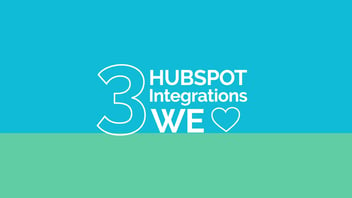For any digital marketing professional worried about SEO, you have become accustomed to seeing “Unknown keywords” in your organic search analytics, making it more difficult to really understand how people are really finding you via Google Search. This past November, HubSpot added Google Search console to its lengthy list of integrations, and users everywhere rejoiced. For marketers using HubSpot’s Marketing Hub tools, this means that search optimizations are going to be easier than ever.
According to HubSpot, “the new Google Search Console integration brings important search data—such as average position, total impressions, and click-through rate—directly into the Marketing Hub so you see this alongside the content you are creating and use these metrics to make more informed decisions.”
This new integration will ultimately help you refine your SEO strategy for 2019 and beyond. Here’s why you should activate it, if you haven’t already.
SEO Has Changed (and Continues to Evolve)
SEO is no longer about writing for search engines with keywords and metadata; you have to actually write helpful content for you audience. This means taking the time to really understand what they’re searching for and more importantly...why. As HubSpot recommends, the best approach for SEO is to organize your content into topics, then use search data to optimize and determine what exactly to write about.
In other words, you have to think beyond the keyword and make sure your landing page or blog is delivering a good experience. Traffic alone isn’t enough to maintain your authority or rank on results pages if you continue to have high bounce or exit rates over time. With this integration, you can bypass the dreaded “Unknown Keywords” and see how people are finding your content.
Better Content Strategy
Content is at the heart of any Inbound strategy, but it’s a crowded and competitive landscape for content creators. The old best practices were to write and optimize your blogs and ebooks to meet prospects where they are in their buyer’s journey, but with more competition for popular keywords and a saturation of ebooks across industries, your content strategy for 2019 and beyond should shift to a better understanding of what questions your potential customers may be asking and presenting answers in a valuable way (and maybe thinking outside the ebook).
Last year HubSpot replaced it’s SEO keyword explorer tool with the Content Strategy tool to help users better build content around relevant topics. Along with the Google Search Console integration, the Content Strategy tool can help ensure you’re approaching SEO in a way that is effective. Plus, it doesn’t hurt to have all your data in one place to get a comprehensive idea of how your strategy is doing over time.
More Comprehensive (and Convenient) Analytics
Speaking of comprehensive ideas, you should be continually testing and optimizing your inbound strategy. HubSpot Analytics and Google Analytics should both be in your digital marketing toolkit to get a complete picture of how your site is performing. Now with the HubSpot + Google Search Console integration, you can get the best of both worlds all in one place, right alongside your content.
The integration is easy to activate, especially if you’re already using Google. So as you dive into your 2019 content strategy, leverage this integration to get a better understanding of your audience and become the master of your search queries.
Ready to launch the integration? Hubspot has instructions. Of course, we’re also happy to help.
Want to see what else HubSpot can do? Get started for free.

 3 min read
3 min read








